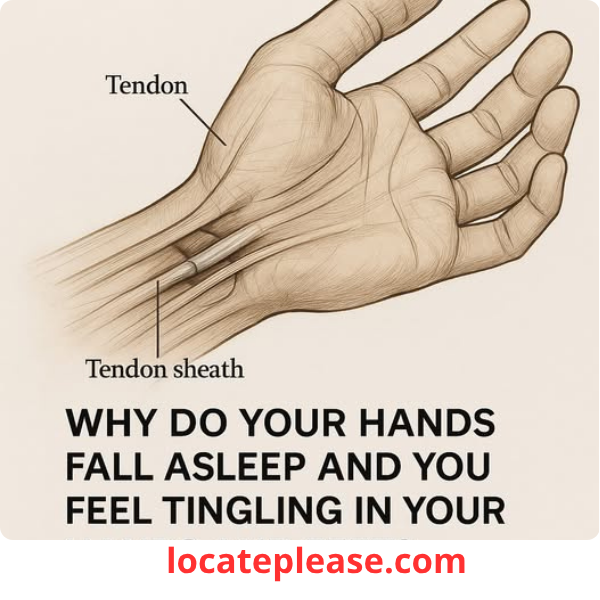Have you ever woken up with a hand that feels like it’s been replaced with a lifeless, tingling starfish?
Or halfway through typing, your fingers go numb, as if they’ve suddenly “checked out”?
That familiar pins-and-needles sensation — medically known as paresthesia — is more than just a quirky bodily glitch. It’s your nervous system sending a signal: “Something’s not right.”
While occasional numbness is common, frequent or prolonged episodes may point to underlying issues — from poor posture to nerve compression.
Let’s explore why your hands fall asleep — and what you can do about it naturally.
What Does It Mean When Your Hands “Fall Asleep”?
When your hand or fingers go numb, tingle, or feel “asleep,” it’s usually due to temporary pressure on a nerve or reduced blood flow to the area.
Nerves act like electrical wires, sending signals between your brain and body. When they’re compressed or irritated, the signal gets disrupted — leading to:
- Tingling (like ants crawling)
- Numbness
- Burning or prickling
- Weakness in the hand or fingers
In most cases, shaking or moving your hand restores sensation quickly.
But if it happens often — or lasts a long time — it may be a sign of a deeper issue.
Common Causes of Hand Numbness
1. Sleeping in a Bad Position
- Lying on your arm or bending your wrist while sleeping can compress nerves (especially the ulnar or median nerve).
- Result: Waking up with a “dead” hand.
✅ Fix: Adjust your sleep posture. Avoid tucking your hands under your pillow or head.
2. Carpal Tunnel Syndrome
- The median nerve gets compressed as it passes through the carpal tunnel in your wrist.
- Common in people who type, text, or use vibrating tools for long periods.
Symptoms:
- Numbness in thumb, index, middle, and half of the ring finger
- Worsens at night
- May progress to hand weakness
3. Ulnar Nerve Compression (Cubital Tunnel Syndrome)
- The “funny bone” nerve (ulnar nerve) gets pinched at the elbow.
- Often from leaning on your elbows or keeping your arms bent for long periods.
Symptoms:
- Numbness in the ring and pinky fingers
- Tingling that travels from elbow to hand
- Weak grip
4. Poor Posture & Neck Issues
- Slouching or forward head posture can compress nerves in the neck (cervical spine).
- This affects the nerves that run down to your arms and hands.
✅ Tip: Check your workspace ergonomics — your monitor, chair, and keyboard height matter.
5. Vitamin Deficiencies
- Low levels of vitamin B12, B6, or folate can damage nerves and cause paresthesia.
- Common in vegetarians, older adults, or those with digestive disorders.
6. Medical Conditions
Some health issues increase the risk of hand numbness:
- Diabetes – High blood sugar damages nerves (diabetic neuropathy)
- Thyroid disorders – Can cause fluid retention and nerve compression
- Raynaud’s disease – Blood vessels spasm, reducing circulation
- Autoimmune diseases (like lupus or MS)
Natural Remedies to Prevent and Relieve Hand Numbness
You don’t always need medication or surgery. Try these safe, natural solutions first.
🌿 1. Stretch and Mobilize
Daily stretches can relieve nerve pressure and improve circulation.
Try These:
- Wrist flexor stretch: Extend arm, palm up, gently pull fingers back
- Neck rolls: Slowly tilt and rotate your head to release neck tension
- Nerve glides: Gently move the nerve through its path (ask a physical therapist for guidance)
Do 2–3 times daily, especially if you work at a desk.
🌿 2. Improve Your Posture
- Sit with shoulders back, feet flat, and screen at eye level
- Take breaks every 30–60 minutes to stand and stretch
- Use an ergonomic keyboard and mouse
🌿 3. Apply Warmth or Cold
- Warm compress: Relaxes tight muscles and improves blood flow
- Cold pack: Reduces inflammation if swelling is present
Use for 15 minutes at a time.
🌿 4. Boost Nerve-Healing Nutrients
Support nerve health with these key nutrients:
- Vitamin B12 – Found in eggs, fish, dairy (supplement if deficient)
- Magnesium – Relaxes muscles and nerves (leafy greens, nuts, seeds)
- Omega-3 fatty acids – Reduce nerve inflammation (salmon, flaxseeds, walnuts)
🌿 5. Try Herbal Support
Some herbs support circulation and nerve function:
- Ginkgo biloba – Improves blood flow to extremities
- Turmeric – Natural anti-inflammatory
- Passionflower or valerian – Calms nerve irritation (especially at night)
Always consult a healthcare provider before starting herbs.
🌿 6. Acupressure & Massage
- Gently massage the base of your palm, wrist, and forearm
- Apply pressure to acupressure points like “Pericardium 6” (on the inner wrist) to relieve tingling
✅ Use daily or when symptoms flare.
When to See a Doctor
While most cases are harmless, seek medical advice if you have:
- Persistent numbness (lasting hours or recurring daily)
- Muscle weakness or dropping objects
- Loss of coordination
- Symptoms in both hands or spreading up the arm
- Pain in the neck or shoulder
These could signal nerve damage, spinal issues, or systemic disease.
Tests like EMG, nerve conduction studies, or MRI may be needed for diagnosis.
Final Thoughts: Listen to the Signals Your Hands Are Sending
Your hands “falling asleep” isn’t just a quirky sensation — it’s your body’s way of asking for attention.
Whether it’s a bad sleeping position or a deeper nerve issue, addressing it early can prevent long-term damage.
With simple changes — better posture, stretching, and proper nutrition — you can keep your hands awake, strong, and pain-free.
So next time your fingers tingle, don’t just shake it off.
Listen.
Act.
Protect your nerves.
Because your hands do too much to be ignored.






